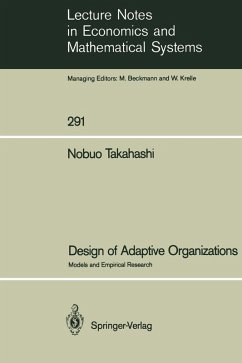Organization design has been discussed by many authors in management and organization theory. They have obtained intuitive and prescriptive propositions appealing that the best organization design is contingent on the environmental conditions. But their studies, called contingency theory, are mostly based on empirical research. Most of the "propositions" are drawn as only inferences from the results of them. On the other hand, decision theoretic models of "organizations" in the stochastic environment have been studied by some economists and management scientists independently of contingency theory. In this book, important aspects of organization design problems are formulated as statistical decision problems in the framework of management and organization theory. Part One of this book analyzes a short-run adaptive problems of the organization design. Part One contains an expanded exposition of the ideas and results published in the professional journals, and I would like to thank the anonymous reviewers of the following journals: Behaviormetrika, Human Relations, Behavioral Science. Part Two of this book considers a long-run adaptive process in the organization, and has not previously been published in its IV present form, although a version of this part is to appear in Journal of the Department of Liberal Arts, March 1987, The University of Tokyo. The resul ts of Part One and Part Two are supported by the empirical research on Japanese firms in Part Three. This research was financially supported by Nippon Telegraph and Telephone Public Corporation (NTT). I acknowledge this gratefully.
Dieser Download kann aus rechtlichen Gründen nur mit Rechnungsadresse in A, B, BG, CY, CZ, D, DK, EW, E, FIN, F, GR, HR, H, IRL, I, LT, L, LR, M, NL, PL, P, R, S, SLO, SK ausgeliefert werden.


